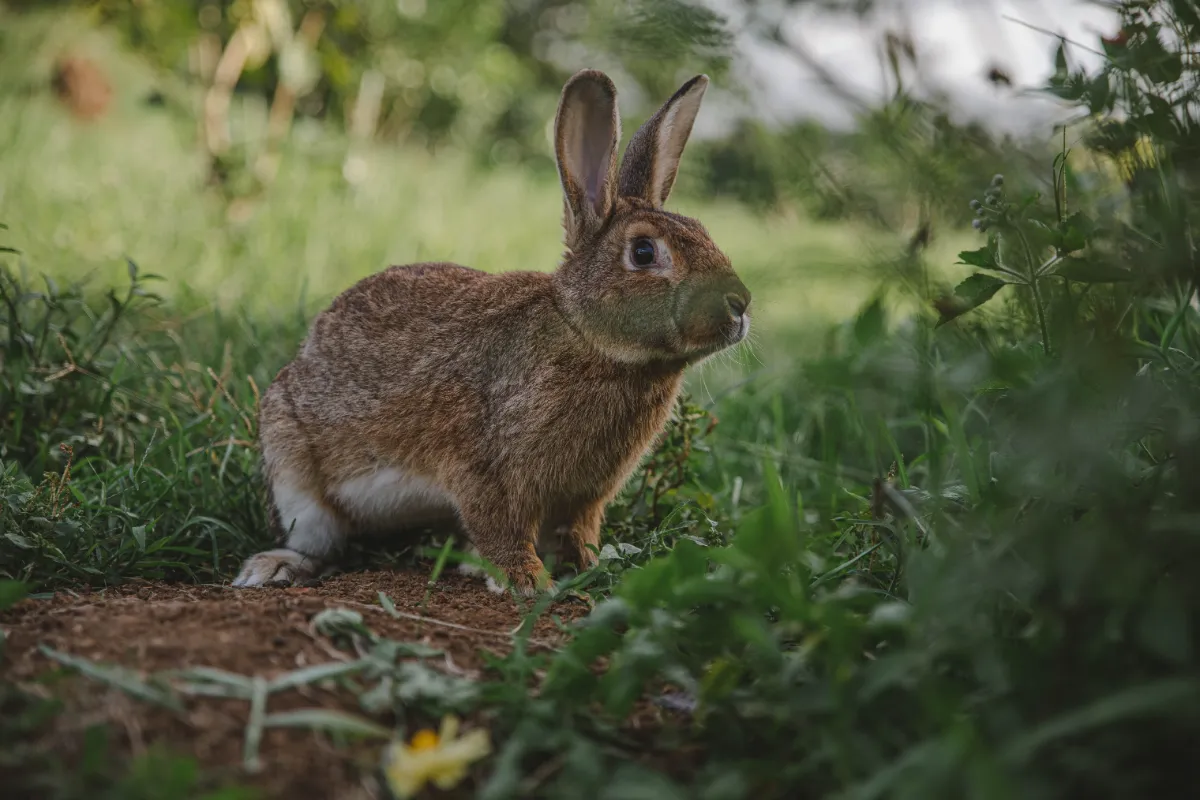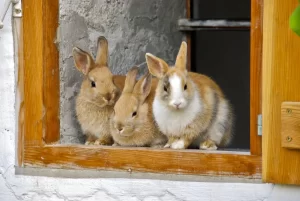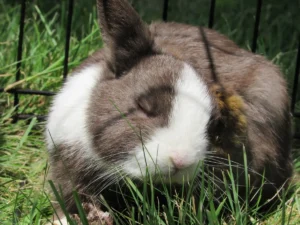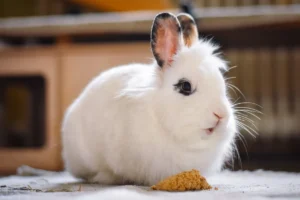Do you ever wonder why rabbits dig holes only to fill them in? It may seem like a pointless task, but there’s a method to their madness.
These furry creatures have natural instincts that drive them to create safe burrows, mark their territory, and even nurture their young. By digging and filling holes, rabbits are able to regulate their temperature, protect themselves from predators, and have some fun along the way.
So, let’s explore the fascinating reasons behind this peculiar behavior.
In This Article
- 1 Key Takeaways
- 2 Natural Instincts of Rabbits
- 3 Creating Safe Burrows
- 4 Marking Territory
- 5 Nurturing Behavior
- 6 Camouflage and Protection
- 7 Regulating Temperature
- 8 Fun and Enrichment
- 9 Frequently Asked Questions
- 9.1 Do Rabbits Dig Holes for the Purpose of Hiding From Predators?
- 9.2 Are There Specific Breeds of Rabbits That Are More Prone to Digging Holes?
- 9.3 Can Rabbits Dig Holes in Different Types of Soil?
- 9.4 Is There a Specific Time of Year When Rabbits Are More Likely to Dig Holes?
- 9.5 Do Rabbits Ever Use the Holes They Dig for Purposes Other Than Burrowing?
Key Takeaways
- Digging is an instinctual behavior for rabbits and serves multiple purposes such as creating burrows for shelter and safety, marking territory, and releasing excess energy.
- Digging provides physical exercise and mental stimulation for rabbits, preventing obesity and boredom.
- Deep burrows offer protection from predators and insulation against extreme temperatures, while regular maintenance ensures structural integrity.
- Rabbits display nurturing behavior towards their young, seek social bonding, and engage in territorial marking through scent glands and urine.
Natural Instincts of Rabbits
You should know that rabbits have five natural instincts that guide their behavior. These instincts are crucial for their survival in the wild.
The first instinct is foraging behavior, which drives rabbits to search for food. They’re herbivorous animals, and their diet primarily consists of grass, leaves, and vegetables. Rabbits have a keen sense of smell and can detect food from a considerable distance.
The second instinct is their mating rituals. During the breeding season, male rabbits engage in various behaviors to attract females. These behaviors include chasing, hopping, and even fighting with other males. Female rabbits, on the other hand, display receptive behaviors to indicate their availability for mating.
These natural instincts play a vital role in the life of rabbits, ensuring their survival and continuation of their species.
Creating Safe Burrows
Digging deep and reinforcing the burrow walls can provide rabbits with a safe haven from predators and harsh weather conditions. Burrow maintenance is essential for the well-being of rabbits. By regularly maintaining their burrows, rabbits ensure the structural integrity of their homes, preventing collapses and potential dangers.
The importance of burrow depth can’t be overstated. A deeper burrow provides rabbits with increased protection from predators, as it makes it more difficult for them to access the rabbits’ nesting areas. Additionally, a deeper burrow offers insulation against extreme temperatures, keeping the rabbits warm during cold winters and cool during hot summers.
Marking Territory
To establish dominance and communicate ownership, rabbits often mark their territory with scent glands and by urinating in strategic locations. This behavior is driven by their natural instincts and serves several purposes. Understanding these behavioral patterns and communication methods can help you better understand your pet rabbit’s needs and provide a suitable environment for them.
- Territorial marking: Rabbits mark their territory to establish dominance and communicate to other rabbits that the area is already claimed. This helps prevent conflicts and territorial disputes.
- Scent glands: Rabbits have scent glands located under their chin and near their anus. They use these glands to deposit their unique scent on objects and surfaces, effectively marking their territory.
- Urinating: Rabbits also use urine to mark their territory. By urinating in specific locations, they leave behind a strong scent that acts as a clear message to other rabbits.
Nurturing Behavior
Understanding and supporting your rabbit’s nurturing behavior is essential for creating a loving and secure bond with your furry companion. Rabbits, like many other animals, possess maternal instincts that drive them to care for their young. These instincts can also manifest in their interactions with humans, as they seek social bonding and connection.
Maternal instincts in rabbits can be observed through various behaviors. They may groom you or other household objects, as if they were grooming their offspring. They might also become protective and territorial, displaying signs of aggression if they perceive a threat to their perceived family unit. These behaviors stem from their natural inclination to ensure the survival and well-being of their young.
To support your rabbit’s nurturing behavior, it’s important to create a safe and comfortable environment. Provide a nesting area with soft bedding and ensure they have access to fresh food and water. Spend quality time with your rabbit, engaging in gentle interactions and providing them with mental and physical stimulation. This will strengthen the social bond between you and your rabbit, allowing them to express their nurturing instincts in a positive and fulfilling way.
Camouflage and Protection
Have you ever noticed how rabbits use their natural ability to blend into their surroundings, so they can stay hidden from potential threats? Rabbits are masterful at camouflage and protection, employing various survival techniques to ensure their safety. Here are three ways rabbits use their exceptional skills:
- Burrow Construction: Rabbits are known for their impressive burrow construction abilities. They dig intricate tunnels underground, creating a network of interconnected chambers. These burrows provide them a safe place to hide from predators and extreme weather conditions.
- Camouflage: Rabbits have evolved to have fur colors that match their natural habitat, allowing them to blend seamlessly into the environment. Their gray or brown fur helps them remain inconspicuous, making it difficult for predators to spot them.
- Freezing Behavior: When rabbits sense danger, they freeze in their tracks, relying on their camouflage to stay hidden. By remaining motionless, they become nearly invisible to predators, increasing their chances of survival.
Rabbits’ burrow construction and survival techniques demonstrate their remarkable adaptability and resourcefulness in the face of potential threats.
Regulating Temperature
Do you ever wonder how rabbits regulate their body temperature to stay comfortable in different weather conditions?
Rabbits have an interesting cooling mechanism that helps them beat the heat. They rely on a combination of behavior and physiology to keep cool.
One important strategy is burrow construction. Rabbits dig deep burrows underground, which provide shelter from the hot sun and help maintain a cooler temperature. These burrows also act as insulation, keeping the rabbits warm in colder weather.
Additionally, rabbits have large ears that help dissipate heat. By increasing blood flow to their ears, rabbits can release excess heat and cool down.
Fun and Enrichment
If you want to provide fun and enrichment for your pet rabbit, consider creating a digging box filled with safe materials for them to explore. Rabbits are natural diggers, and this activity not only satisfies their instinctual behaviors but also keeps them mentally stimulated. By incorporating interactive toys and foraging activities into their environment, you can create a more engaging and fulfilling experience for your furry friend.
Here are three benefits of providing a digging box for your rabbit:
- Physical exercise: Digging requires physical effort, which helps keep rabbits active and prevents obesity.
- Mental stimulation: The act of digging and exploring different textures in the box engages their senses and promotes mental well-being.
- Natural foraging behavior: Hiding treats or food in the digging box encourages rabbits to use their natural foraging instincts, keeping them entertained and engaged.
Frequently Asked Questions
Do Rabbits Dig Holes for the Purpose of Hiding From Predators?
Rabbits dig holes to hide from predators, but the reason they fill them in is unknown. Burrow construction is an instinctual behavior, providing protection and shelter. In addition to digging, rabbits also use their speed and agility to evade predators.
Are There Specific Breeds of Rabbits That Are More Prone to Digging Holes?
Are certain rabbit breeds more inclined to dig holes? Rabbit digging habits and digging behavior in wild rabbits can shed light on this. Let’s explore if specific breeds have a greater propensity for digging.
Can Rabbits Dig Holes in Different Types of Soil?
Rabbits can dig holes in various types of soil. The composition of the soil impacts their hole digging behavior. Factors like hardness, moisture, and texture influence their ability to dig and create burrows.
Is There a Specific Time of Year When Rabbits Are More Likely to Dig Holes?
During different seasons, rabbits’ digging behavior may change. Environmental factors like temperature, food availability, and mating habits can influence their digging habits. Understanding these factors can help you anticipate when rabbits are more likely to dig holes.
Do Rabbits Ever Use the Holes They Dig for Purposes Other Than Burrowing?
Rabbits are known to dig holes for various reasons, but do they use them for more than burrowing? While rabbits don’t use their burrows for storing food, they do dig to create a network of underground tunnels.





